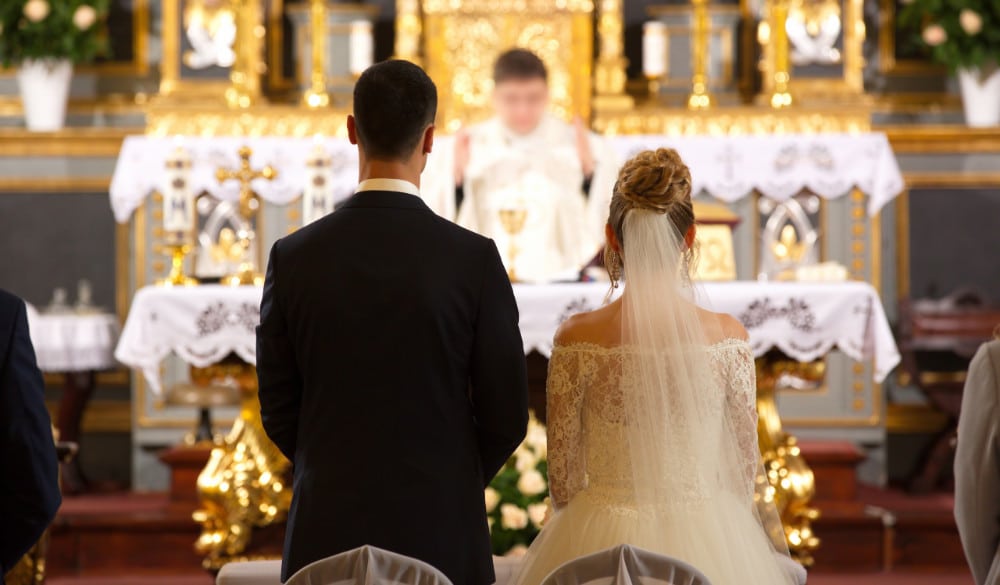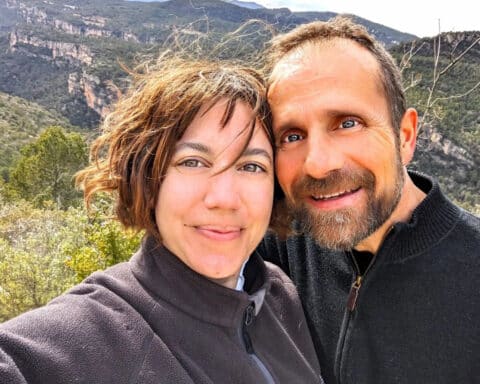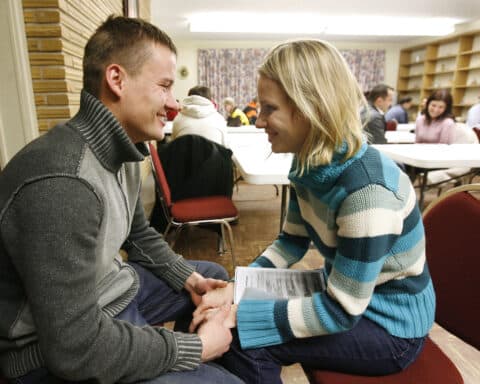The English translation of Catechumenal Pathways for Married Life, a new pastoral guideline published by the Vatican’s Dicastery for Laity, Family and Life, was published last week on the dicastery website. The document proposes a new model for marriage preparation — one grounded on the catechumenate model.
Catechumens (adults preparing to receive the sacraments of initiation) pass through a variety of rites, accompanied by a sponsor for a period of time, typically lasting a year. Calling the document both a “gift” and “responsibility,” Pope Francis writes in the document’s introduction that the guidelines must be “welcomed” and “adapted.” “It is a dress that must be ‘tailor-made’ for the people who will wear it,” the pontiff said.
 The new guidelines offer a catechumenate that includes three stages of formation: proximate preparation (about a year), final preparation (a few months) and accompaniment (the last phase stretching into the first years of marriage). Julia Dezelski, assistant director of the USCCB’s Secretariat of Laity, Marriage, Family Life and Youth, told Our Sunday Visitor, “It should not be seen as an additional hurdle to overcome or one more burdensome detail before one’s wedding day. On the contrary,” Dezelski explained, “the purpose of this document is to guide the engaged couple to greater intentionality by allowing them more calm, catechesis and co-responsibility as they prepare for the Sacrament of Marriage.”
The new guidelines offer a catechumenate that includes three stages of formation: proximate preparation (about a year), final preparation (a few months) and accompaniment (the last phase stretching into the first years of marriage). Julia Dezelski, assistant director of the USCCB’s Secretariat of Laity, Marriage, Family Life and Youth, told Our Sunday Visitor, “It should not be seen as an additional hurdle to overcome or one more burdensome detail before one’s wedding day. On the contrary,” Dezelski explained, “the purpose of this document is to guide the engaged couple to greater intentionality by allowing them more calm, catechesis and co-responsibility as they prepare for the Sacrament of Marriage.”
But Pope Francis is not the first pope to call for marriage preparation to imitate the catechumenate. Richard Budd, director of Marriage and Family Life in the Diocese of Lansing, Michigan, said, “The Diocese of Lansing began using a marriage catechumenate as its model for marriage preparation in 2018, because, at the time, we wanted to fulfill St. John Paul II’s dream for a marriage catechumenate from his 1981 document Familiaris Consortio.” Budd also pointed out that this fulfills the instruction of the General Directory of Catechesis that calls for all forms of catechesis to be modeled on the catechumenate.
Theologians and pastoral leaders have emphasized the importance of finding faithful couples who can be examples to younger couples. Paul Gondreau, a professor of theology at Providence College, said, “Broken marriages, broken families, broken relationships, abusive and toxic relationships, sexual confusion, sexual experimentation and exploitation — these abound all about us.” Gondreau attributed that need to the fallout of the sexual revolution. He continued, “What young people need the most to be well prepared for marriage, then, are concrete examples of the joy and beauty of Christian marriage that the Sacrament of Marriage makes possible.”
The document was received with no small amount of criticism when it was first released in Italian this summer. Many commentators suggested that its new structures, rituals and protracted timeframes are just one more example of the Church being out of touch and failing to meet the needs of everyday Catholics. Expressing concern about the new timeframes, Gondreau insisted, “Yes, we want engaged couples to be well prepared for married life, but we also want to help them get married sooner rather than later.”
For his part, Timothy O’Malley, professor of theology at the University of Notre Dame (and a frequent contributor to Our Sunday Visitor), argued, “The Church can’t simply keep doing what she has been doing for the long haul.” O’Malley points out that now Catholics are not only forgoing marriage in the Church, but they’re eschewing marriage altogether. “I experience in my class on marriage and family life a fear of commitment, a lack of awareness of the theological and, therefore, sacramental dimensions of the sacrament, and bad habits picked up from participation in a hookup culture where conjugal intimacy is traded in for quick encounters that enable one to feel (for a moment) beloved,” he said.
Budd is of similar mind. “I believe that this is an authentic fruit of the Second Vatican Council, because at its core, the council was about presenting Christ anew to a world that had lost sight of him, Budd said. “The catechumenate, which includes the preaching of the kerygma, is an ancient method of accompanying someone from unbelief to belief.”
Similarly, Gondreau emphasized that “Christ alone — via the Sacrament of Marriage — is the true antidote to this situation.” He hoped that the catechumenate would assist engaged couples “to establish habits of prayer (both individually and together as a couple) and of open communication.”
The guidelines add an additional 6-8 months of preparation, explained Dezelski. “In all areas of our lives, we spend much more time preparing for that which we care most about: years of schooling and education, athletic training, instruction in music or the arts, etc.,” she said. Defending the extended duration, Dezelski said, “Our discernment to marriage as a vocational path, as well as our choice of a spouse, is an undertaking that merits the same seriousness and commitment.”
Likewise, O’Malley said, “It’s right to ask why priests have received an extensive formation, while married couples get a weekend retreat and take a test, which has little impact on their common discernment.” According to him, the document raises the bar, understanding that the very meaning of marriage is living out of the Eucharistic mystery at the heart of the Church.
Concerning implementation, Dezelski said that “every diocese has the prerogative and responsibility to implement these pathways based on their local reality as a particular Church.”
According to her, many dioceses have already begun to do so. “At the same time,” she said. “the USCCB will provide support to the diocesan implementation such as demonstrating the complementary stages of preparation, which were already established in the ‘National Pastoral Framework for Marriage and Family Life, Called to the Joy of Love,’ that was published June 2021.” That document, according to Dezelski, anticipated the framework of the new guidelines.
“Most of all,” O’Malley said, “the document recognizes that things will go wrong in the lives of the couple. Rather than pretend that this isn’t happening, it invites the entire Christian community to respond to these perilous situations.”
Father Patrick Briscoe, OP, is editor of Our Sunday Visitor. Follow him on Twitter @PatrickMaryOP.





